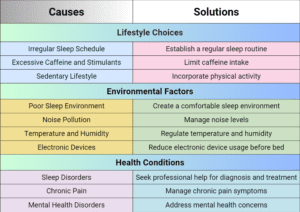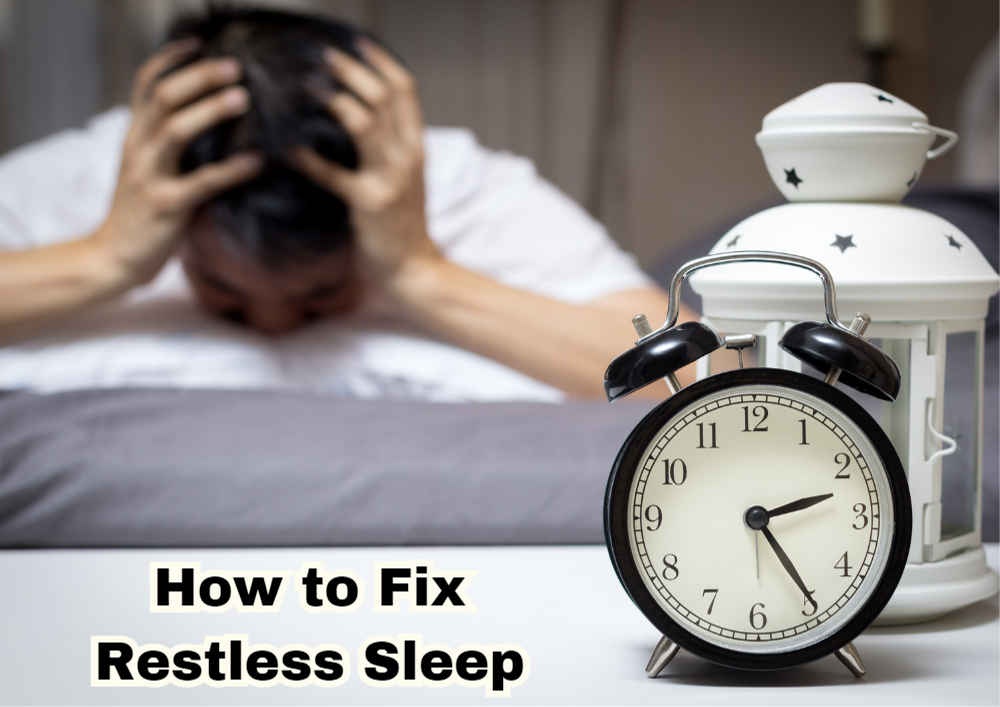Restless sleep refers to sleep disturbances interrupting the continuity and restfulness of sleep. It can manifest in different ways, such as trouble falling asleep, waking up frequently during the night, or feeling unrested even after a full night’s sleep.
Restless sleep is frustrating as it causes discomfort at night and impacts daytime functioning. It results in decreased productivity, mood swings, and low energy levels. Several factors contribute to restless sleep, including lifestyle choices, environmental factors, and underlying medical conditions.
In this blog post, we will explore the reasons behind restless sleep, understand how it affects various areas of your life, and share effective solutions to help you overcome this common problem.
What causes restless sleep
Restless sleep can be caused by various factors that disrupt the natural sleep cycle and prevent you from attaining a deep, restful sleep. Understanding these causes is essential in addressing and overcoming the issue. Let’s explore some common factors that contribute to restless sleep:
Lifestyle Choices
Our daily routines and habits play a significant role in the quality of our sleep. Here are some lifestyle choices that can contribute to restless sleep:
a. Irregular Sleep Schedule: Inconsistent sleep patterns, such as staying up late on weekends and then attempting to compensate during the week, disrupt our natural circadian rhythm. This inconsistency can make it difficult to fall asleep and wake refreshed, leading to restless nights.
b. Excessive Caffeine and Stimulants: Consuming stimulants like coffee, tea, or energy drinks close to bedtime can interfere with our ability to fall asleep. Similarly, alcohol may initially induce drowsiness, but it disrupts the later stages of sleep, causing fragmented and restless sleep.
c. Sedentary Lifestyle: Lack of physical activity or a sedentary lifestyle can contribute to restless sleep. Regular exercise promotes more profound, restorative sleep, while a sedentary lifestyle can lead to increased restlessness and difficulty falling asleep.
Environmental Factors
The sleep environment can significantly impact the quality of our sleep. Consider the following environmental factors that can cause restless nights:
a. Poor Sleep Environment: Uncomfortable mattresses, noisy surroundings, bright lights, or excessive use of electronic devices in the bedroom can disrupt our sleep. These factors create a less-than-ideal sleep environment, making it challenging to achieve restful sleep.
b. Noise Pollution: Loud noises from traffic, construction, or snoring partners can disrupt our sleep, preventing us from reaching deeper sleep stages. The presence of constant noise can lead to frequent awakenings and fragmented sleep.
c. Temperature and Humidity: Extreme temperatures or high humidity levels in the bedroom can make it difficult to achieve and maintain a comfortable sleep. Unfavourable conditions like excessive heat or cold can cause discomfort, leading to restlessness and disrupted sleep.
d. Electronic Devices: In today’s digital age, it’s hard to escape the allure of electronic devices. Yet, the blue light emitted by smartphones, tablets, and laptops can interfere with our natural sleep-wake cycle. This disrupts the production of melatonin, a hormone essential for sleep regulation, leading to difficulty falling asleep and achieving restful sleep.
Health Conditions:
Various medical and psychological conditions can contribute to restless sleep. The following health conditions can disrupt sleep and lead to restlessness:
a. Sleep Disorders: Conditions such as insomnia, sleep apnea, restless leg syndrome, or narcolepsy can severely disrupt sleep patterns and prevent restful sleep. These conditions often result in difficulties falling asleep, maintaining sleep, or experiencing refreshing sleep.
b. Chronic Pain: Conditions like arthritis, fibromyalgia, or injuries can cause discomfort and pain, making it challenging to find a comfortable sleep position and maintain sleep throughout the night. Pain can lead to frequent awakenings and restless sleep.
c. Mental Health Disorders: Anxiety, depression, and stress contribute to racing thoughts, rumination, and emotional distress that interfere with sleep. These conditions often lead to difficulties in falling asleep, staying asleep, or achieving a state of deep and restful sleep.
The Impacts of Restless Sleep
Restless sleep can have wide-ranging impacts on our daily lives and overall well-being. Understanding these impacts can highlight the importance of addressing and resolving your sleep issues. Let’s explore the various areas that can be affected:
- Daytime Fatigue: Insufficient sleep leaves us feeling tired, drained, and lacking energy, which can affect our productivity, mood, and overall performance.
- Cognitive Impairment: Restless sleep can impair cognitive functions such as memory, concentration, problem-solving, and decision-making abilities.
- Mood Disturbances: Lack of quality sleep often leads to irritability, mood swings, heightened emotional reactivity, and an increased risk of developing mental health issues like depression and anxiety.
- Weakened Immune System: Chronic sleep disturbances can weaken our immune system, making us more susceptible to illnesses and infections.
- Relationships and Interpersonal Dynamics: Fatigue and irritability resulting from restless sleep can strain our relationships with family, friends, and colleagues. Our ability to communicate effectively and engage in meaningful interactions may be compromised.

Effective Solutions to Fix Restless Sleep
I. Establish a Sleep Routine:
- Consistent sleep schedule: Go to bed and wake up at the same time every day to regulate your body’s internal clock.
- Create a relaxing bedtime routine: Engage in calming activities like reading or taking a warm bath to signal your body that it’s time to sleep.
- Optimize sleep environment: Ensure your bedroom is dark, quiet, and at a comfortable temperature to promote better sleep.
II. Manage Stress and Anxiety:
- Stress reduction techniques: Practice stress management techniques such as deep breathing exercises, yoga, or journaling to relax your mind and body before bed.
- Cognitive-behavioural therapy for insomnia (CBT-I): Consider therapy techniques that address the underlying thoughts and behaviors contributing to sleep disturbances.
- Relaxation exercises: Incorporate techniques like progressive muscle relaxation or guided imagery to unwind and prepare your body for sleep.
III. Adopt Healthy Lifestyle Habits:
- Regular exercise: Engage in moderate-intensity exercise during the day to promote better sleep at night.
- A balanced diet and mindful eating: Avoid heavy meals before bed and opt for sleep-friendly foods like whole grains, fruits, and herbal teas.
- Limit caffeine and other stimulants consumption: Reduce or eliminate the intake of coffee, tea, or energy drinks close to bedtime, as they can disrupt your sleep patterns and make it harder to fall asleep. Instead, choose decaffeinated beverages or herbal teas that promote relaxation.
IV. Create a Sleep-Friendly Environment:
- Optimize bedroom environment: Keep your bedroom clean, clutter-free, and dedicated to sleep to create a calm and peaceful atmosphere.
- Comfortable bedding and pillows: Invest in a supportive mattress and pillows that align with your sleep preferences.
- Minimize noise and light disruptions: Use earplugs, eye masks, white noise machines, or blackout curtains to minimize external disturbances.
V. Practice Sleep-Enhancing Techniques:
- Progressive muscle relaxation: Tense and release different body muscle groups to promote physical relaxation and reduce tension.
- Deep breathing exercises: Practice slow and controlled breathing techniques to calm your nervous system and prepare for sleep.
- Meditation and mindfulness: Engage in meditation or mindfulness practices to quiet your mind and promote a sense of calm before bed.
VI. Limit Electronic Devices Usage:
- Establish a digital curfew: Avoid using electronic devices, such as smartphones or laptops, at least an hour before bedtime.
- Blue light filters: Use blue light filters or enable night mode on your devices to minimize exposure to sleep-disrupting blue light.
- Avoid stimulating content before bed: Avoid stimulating activities or consuming content such as action-packed movies, thrilling novels, intense video games, stimulating music, engaging in heated debates or arguments, and browsing social media feeds filled with exciting or emotionally charged posts.
VII. Seek Professional Help if Needed:
- Consult a sleep specialist: If you continue to experience restless sleep despite making lifestyle changes, consult a healthcare professional or sleep specialist for a comprehensive evaluation and personalized advice.
- Explore medical interventions: In certain cases, medications or therapies may be recommended to address specific sleep disorders.
- Address underlying sleep disorders: Seek appropriate treatment for underlying sleep disorders, such as sleep apnea or restless leg syndrome.
Conclusion
Restless sleep can significantly impact your overall well-being and productivity. However, by thoroughly understanding its causes and implementing effective strategies and lifestyle changes, you can take significant steps towards improving your sleep quality and waking up feeling refreshed and energized. With persistence and a proactive approach, you can overcome restless sleep and achieve your desired restful nights.
